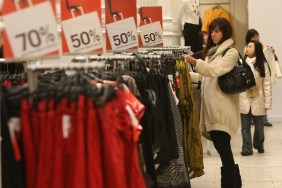H&M has pledged to raise the wages of 850,000 textile workers by 2018. The company’s head of sustainability, Helena Helmersson, told the AFP on Monday that it “might be a possibility” that higher labor costs would result in a price-hike long term, but insisted that prices would remain stable in the near future. The company has also announced a plan to lobby the Bangladeshi government to raise the minimum wage and institute annual reviews. (H&M is the largest buyer of clothes in Bangladesh.)
In an interview posted to H&M’s corporate blog, Helmersson argues that retail prices don’t necessarily correlate to production costs:
“Many people seem to believe that low prices are automatically related to bad working conditions and low wages. In fact, today, many garments are produced in low cost countries, regardless of their sales price. The truth is that the price of a garment does not tell us much about how it is produced. We share many of our suppliers with a lot of other brands. Wages for the workers are the same no matter which brand’s order they work on.”
That’s an important point. In July, the Wall Street Journal reported that Armani, Ralph Lauren and Hugo Boss have all outsourced manufacturing Bangladesh; in many cases, higher-end labels even use the same factories as fast fashion chains. Production is just one component of a fashion company’s operational costs (consider the costs associated with retailing, merchandising, administrative, advertising) and it doesn’t necessarily have a direct relationship to price. Clothing retailers tend to determine price according to what consumers will pay, not based on production costs.
This September, H&M reported $900 million in operating profits for the third quarter. The company won’t go broke paying its textile workers more than $68 a month (the current minimum wage in Bangladesh; recently increased from $38), but its brand may get a boost from the positive PR.
Related:
- How Do Luxury Brands Determine Price?
- 5 Things to Read About the Tragic Bangladeshi Garment Factory Fire
- Watch: The Shockingly High Costs Of Fast Fashion Panel
- Organic by John Patrick: The Ethical Designer and Tiffies Winner Explains Why the Fashion System is Broken
- Ethical Fashion: 5 Labels That Are Doing Everything Right
- Can a Startup Lead the Way to an Ethical Consumer Movement? A Conversation With the Founders of Zady
- H&M CEO Speaks Frankly About Overseas Factories and ‘Too Thin’ Models
- Watch American Apparel CEO Dov Charney Go After H&M for its Labor Practices on a VICE Podcast






